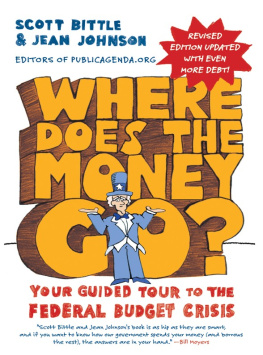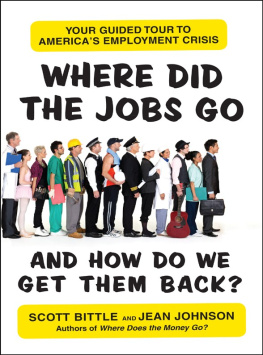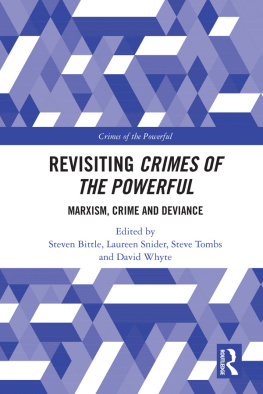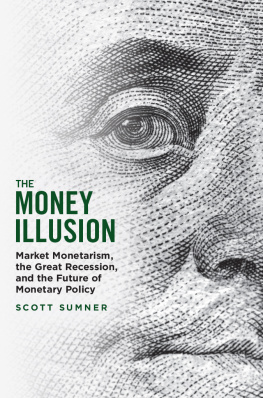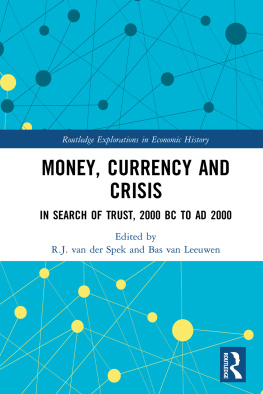W here Does the Money Go? Your Guided Tour to the Federal Budget Crisis is exactly what it says it isa straightforward explanation of what politicians, economists, think tanks, and lobbyists are arguing about when they fight about the federal budget. We published an earlier edition of this book in 2008 when the United States overall debt was about $9 trillion dollars. Even though thats a breathtaking amount of money, we spent quite a few pages of that first book explaining why people should please, please pay attention to this issue. Just three years later, the federal debt is on track to reach $15 trillion by the end of 2011, and our governments habit of spending more than it collects in taxes has become a political firestorm. If the whole situation werent so alarming, we might be able to enjoy saying I told you so. But to be perfectly honest, we never thought things would get so much worse, so quickly.
Unfortunately, there is just no more time to savor the moment. What we need to do now is take a sensible, reality-based look at our choices, and, as a country, come to some agreement on what to do.
ITS GREEK TO US
Not only is the budget a hotter political topic than it was in 2008, recent developments have made the countrys predicament even more treacherous. Little did we know when we wrapped up that last edition that in just a few years:
The economy would go into a terrifying tailspin, cutting tax revenues, forcing huge government spending in an attempt to stave off disaster, and putting us in a worse budget situation than nearly anyone predicted. This is something well be talking about throughout the book.
Congress would pass and the president would sign major health care reform legislation that could have good, bad, and unforeseen fallout for the budgetand it may well have all three.
Greece would become exhibit A for what happens when countries live beyond their means. The United States is not Greece, and if we make some reasonable decisions soon, well never have to go there, but the irony of watching Athenians riot in the streets as their country goes bankruptwell, it does make you think, and it should.
There are a lot of moving parts to the countrys budget problem so solving it is not going to be easy, but at its base, the issue is pretty straightforward.
The United States is seemingly addicted to spending more than it takes in. Weve already piled up an unbelievable national debt. Even worse, we face truly gigantic expenses as the baby boomers begin to retire and need more health care. Todays problems will seem like a fender bender compared to the economic train wreck the country will face if we dont get the nations finances under control.
Weve written this book because we believe that there are millions of Americans who are uneasy about where the country is headed and want to understand what the budget situation really is and what the options are. We are also convinced that there are millions of Americans who are tired of political leadersRepublicans and Democrats, liberals and conservativeswho bob and weave around this issue. We think there are plenty of citizens across the country who want to begin to figure this thing out for themselves. As authors, our job is to explain the problem and the options as clearly and fairly as we can.
A WORD ABOUT WHERE WERE COMING FROM
Where Does the Money Go? is not a book for policy makers and economists. Its a guide for people who care about where the country is going, but dont have the time or inclination to become budget experts. And for readers who do get a bit hooked on the topicsometimes people doweve provided lists of publications, organizations, and Web sites specializing in things budgetary in the appendix, so you can go forth and multiply. The country definitely needs more of you. For most of us, however, the first order of business is to grasp the essentials so your votes and your contributions can go to candidates who truly represent your interests.
Since were presuming to explain this topic, and since it is complicated and controversial, we believe readers have a right to know where were coming from. We both work for a nonprofit, nonpartisan research organization called Public Agenda where we write about public policy issues and conduct public opinion research (you can check out the organization at www.publicagenda.org). Consequently, both of us have spent a lot of time listening to very knowledgeable people talk about the federal budget, the deficit, the debt, and the aging of the baby boomers. We also have a lot of experience translating expert information into terms and concepts nonexperts can understand. Its been part of our jobs. Heres the approach weve taken in Where Does the Money Go?
First, we consider ourselves translators, not budget experts. We have done our homework on the issue (our reading list is in the appendix), and weve asked for and gotten advice from some of the most informed and intellectually honest people in the country. Weve pulled that best advice together in one volume. We hope weve done it in an understandable and readable way.
Second, were explainers, not advocates. You want to find the man with the plan? There are books, articles, and op-eds in the thousands pushing for specific solutions to the countrys financial problems. Thats not our purpose here. Instead, weve tried to lay out the information and the choices so you can come to your own conclusions about what should be done. Our last chapters contain tools enabling you to do just thatdecide the matter for yourself. Naturally, there are areas where the facts and figures are in dispute and where experts disagree (its just part of their job description to disagree). When this happens, we try to help you understand the nature of the disagreement. When there seems to be a pretty strong consensus of expert opinion one way or the other, we tell you that, too.
Third, were optimists, not pessimists. As you will read in the following pages, the federal government has been spending more money than it takes in for some time now, and we have some huge financial commitments coming due. A lot of experts believe the country is taking grave risks with the economy and our future standard of living by not addressing the problem. Some of the predictions for what could happen ten or twenty years down the road are frightening. But there are steps the country can take to reduce these risks, and we believe there are solutions and compromises that would be acceptable to millions of Americans. Were also convinced that most people, once they understand whats at stake, will want to act and elect leaders committed to tackling this problem. As we said, were optimists.
Fourth, we believe that decisions about the countrys budget problems cant be postponed any longer. You can certainly find experts who argue that creating jobs is a higher priority than tackling the deficit or fixing the problems facing Social Security and Medicare. Some economists say that raising taxes now will endanger the economy. Some believe that now is the time for government to spend moreto make investments that will spur economic growth and create jobs in the future. Given what the U.S. economy has been through recently, there are certainly fair arguments about how fast to move on the budget issue and exactly where to start. But what we cant do any longer is to continue to sweep this problem under the rug. We cant keep pretending that sometime in the future, there is going to be a better time to take it up. Many solutions need to be phased in gradually, and many will take years to make a real impact. The country as a whole faces a major learning curve. So it is timeright now, this yearto start grappling with our choices. We need to take an honest, clear-eyed look at where this country stands financially. We need to put everything on the table and start talking about real solutions. And then, we need to agree on a plan and stick to it.


